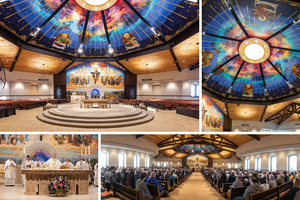Catholic Farmer Jonathan Elliot — “We Are the Royal Stewards of God”
“We are here to bring God’s goodness to the rest of creation.”

The farming life appeals to people for many reasons, and for this farmer, Jonathan Elliot, his Catholic faith fits into many different aspects of his rural lifestyle in Marshall, Virginia. Farming, however, was not on his radar as a youngster.
Born and raised in Fairfax County, Virginia, Elliot did grow up in a Catholic family, so his faith was always part of his being. “Both parents are adult converts and my sisters and I were baptized in the church,” he said.
Farming and food were not, however. “I had no interest in food preparation or production until college,” he said. “Then my older sister gave me a copy of Michael Pollan’s Omnivore’s Dilemma. For the first time I really thought about food.” After reading the book, his perspective on how to raise animals and crops changed over time. As a result, he started visiting farmers in the Charlottesville, Virginia area and got connected with his future boss, Catholic farmer Jesse Straight, who had just moved to a farm in Warrenton, Virginia.
Elliot also found his faith formation growing as well. “I was interested in the Catholic intellectual tradition,” he said. “I read up on those topics, and learned how to see the work through a Catholic lens. I started to see that there was a given order to creation and that it had harmony, beauty, and logic. And creation is not just for us to use to whatever ends we desire… Those ideas were starting to take shape in my life.”
By the time he graduated from the University of Virginia, he had become a different person. When he had time from his fulltime job, he helped Jesse Straight with farm work at Whiffletree Farm. He also got a Master’s in theological studies from the Dominican House of Studies in Washington, DC. He wrote his Master’s thesis on Thomistic theology of work, inspired by his farming to reflect on the intersection of human action, creation and society.
While Elliot enjoyed the rural work, he did not think that a fulltime farming life was his calling. Yet, part way through his Master’s program, Straight asked him to become a fulltime partner. “After thinking about that,” he said, “I decided to join Jesse fulltime.” He worked there until the summer of 2019, when he and his wife started Living Pastures Farm in Marshall, Virginia. “We use the land to raise livestock using regenerative farming practices,” he said. “We started with cattle and also plan to raise chickens and pigs this coming year.”
Elliot admits that the faming life has taught him some valuable lessons about God and life itself. “There is a beautiful order to creation all the way down to bacteria,” he said. “You find in the soil such complex organisms. This harmony is a result of the loving, all-knowing God. … We are here to bring God’s goodness to the rest of creation. We are the royal stewards of God.”
He has also come to understand what it means to be a human and what “good works” is. People have bodies for a reason, he said, and physical work can be satisfying and meaningful. “With farming,” he said, “one must be very engaged with work because it is so physically and mentally demanding. It calls forth the whole human person.”
In the end, Elliot continues to learn more about the created order through study, talking with others, research, and webinars. “I am seeing how nature operates,” he concluded.
* * * * * * *
Beef Stew
One of the soup’s main ingredients is beef soup bones, which Jonathan Elliot said are “an under-appreciated cut.” He suggested serving this dish with fresh cilantro, sour cream and a squeeze of lime on top.
Serves 4 to 6
- 1 package soup bones, seared medium-high heat for 4 minutes per side
- 2 pounds beef stew meat, such as fajita meat, etc.
- 2 medium onions, peeled, chopped, and sauteed
- 2 too 3 cloves garlic, peeled, then sliced or minced
- 1 small can tomato paste
- 1 (14.5-ounce) can diced tomatoes
- Half of one (7-ounce) can chipotles in adobo sauce, including some of the sauce
- One 4.5-ounce can chopped green chiles
- 3 to 4 cups water
Combine all in a big Dutch oven and cook on low heat for about 6 hours. Alternatively, cook in a 250-degree oven, on the stove over low heat, or in a slow cooker for about 6 hours. Use a slotted spoon to remove all pieces of bone and “soup bone meat” from the soup. Put on a cutting board. Allow the meat to cool a little so you don’t burn yourself! Piece apart the meat from the soup bones and remove any gristle. Return the meat to the stew.
Then add:
- One 15.5-ounce can corn, drained, or frozen corn
- 1 tablespoon tapioca flour dissolved in a 3 tablespoons water
- 1 or 2 tablespoonsful of cocoa powder
- 1 teaspoon ground cinnamon
- Salt to taste
Cook just an hour more, so flavors could get happy.
- Keywords:
- Jonathan Elliot
- farming
















